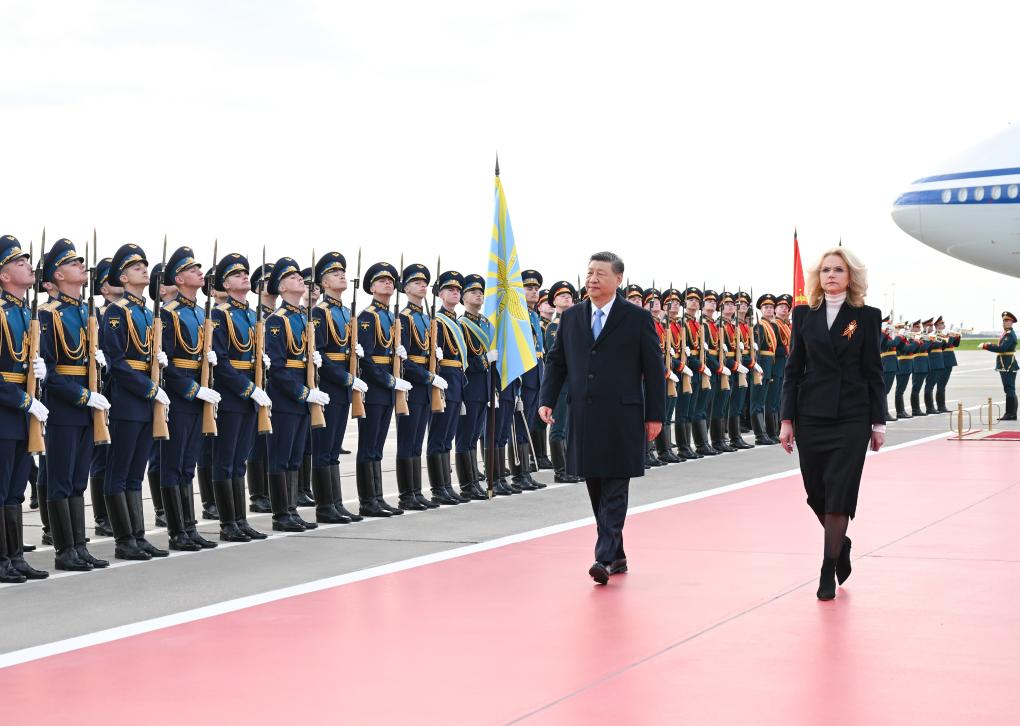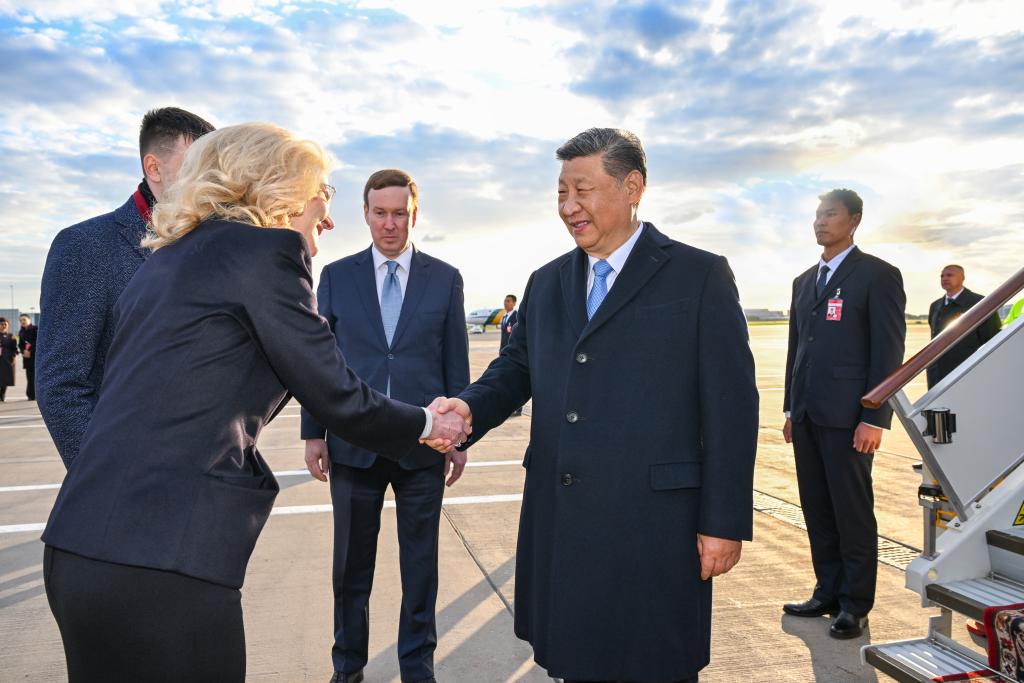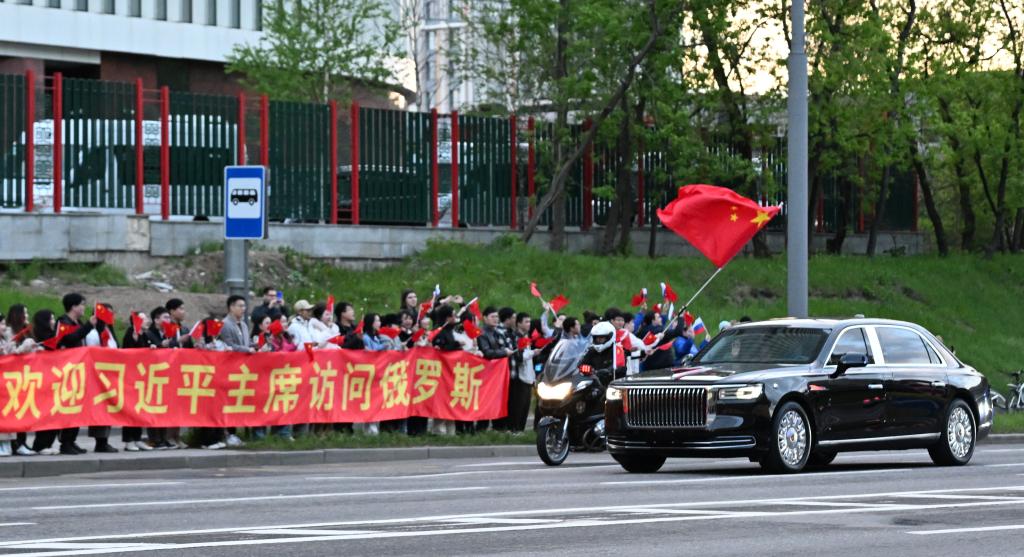
MOSCOW - Chinese President Xi Jinping said on Wednesday that China and Russia have found a right path of state-to-state interactions between neighboring major countries.
He made the remarks in a written statement upon his arrival in Moscow for a state visit to the country and attendance at the celebrations marking the 80th anniversary of the victory in the Soviet Union's Great Patriotic War.
Xi's visit comes at the invitation of Russian President Vladimir Putin. This marks his 11th visit to Russia since he became the president of China.
Xi noted that the two sides, as good neighbors that cannot be moved away, true friends who share weal and woe, and good partners of mutual achievement, have forged a spirit of strategic coordination for a new era, which features permanent good-neighborly friendship, comprehensive strategic coordination and mutually beneficial cooperation.
The independent, mature and resilient bilateral relationship, Xi said, not only brings great benefits to the two peoples, but also makes important contributions to maintaining global strategic stability and promoting an equal and orderly multipolar world.
READ MORE: Xi: Friendship forged with blood, lives source of China-Russia amity
This year marks the 80th anniversary of the victory in the World Anti-Fascist War and the 80th anniversary of the founding of the United Nations, he noted.
China and Russia, both major countries of the world and permanent members of the UN Security Council, will join hands to safeguard the victorious outcome of World War II (WWII), firmly safeguard the UN-centered international system and the international order underpinned by international law, resolutely oppose hegemonism and power politics, practice true multilateralism, and promote the building of a more just and equitable global governance system, Xi said.
Xi also called for concerted efforts to defend the legacy of WWII victory as the world is once again reeling from the specter of hegemonism and power politics.

He said China and Russia will work together to safeguard the victorious outcome of WWII, and resolutely oppose hegemonism and power politics.
The Chinese president also said that during the visit he will have in-depth communication with President Putin on bilateral relations, practical cooperation as well as major international and regional issues of common concern, which will inject strong impetus into the development of the China-Russia comprehensive strategic partnership of coordination for a new era.
ALSO READ: Beijing, Moscow set to further safeguard international order
Noting that he will attend Russia's May 9th Victory Day celebrations again after a decade, Xi said he looks forward to working with leaders of other countries and the Russian people to deeply commemorate the martyrs who heroically sacrificed their lives for the victory in the World Anti-Fascist War, and send out a strong voice of the times to safeguard international fairness and justice.
Xi's plane was escorted by Russian Air Force aircraft after it entered the country's airspace.
When Xi arrived at the Vnukovo Airport in Moscow, he was warmly welcomed by Russian Deputy Prime Minister Tatyana Golikova and other senior government officials.
A massive military parade will take place in Moscow's Red Square on Friday. Flags with the word "Victory" fluttered in the wind along the streets of Moscow, and the roads were lined with billboards and decorative windows depicting the history of the Great Patriotic War of the Soviet Union.
On the night of May 8, 1945, Germany signed the surrender document in Karlshorst, Berlin, marking the end of WWII in Europe. However, due to the time difference, Moscow had already entered May 9 -- the date the Soviet Union, and later Russia, commemorates as "Victory Day".
Meanwhile in Asia, China's final major campaign against Japan – the Battle of Western Hunan – reached its decisive phase. Japan's surrender aboard the USS Missouri in Tokyo Bay on Sept 2, 1945, brought WWII to an end.
ALSO READ: China, Russia's sacrifices must not be forgotten
In a signed article published in the Russian Gazette newspaper ahead of his arrival, Xi urged the international community to uphold a correct historical perspective on WWII.
"China and the Soviet Union were the principal theaters of that war in Asia and Europe respectively," Xi wrote. "The two countries served as the mainstay of resistance against Japanese militarism and German Nazism, making pivotal contribution to the victory of the World Anti-Fascist War."

"Any attempt to distort the historical truth of WWII, deny its victorious outcome, or defame the historic contribution of China and the Soviet Union is doomed to fail," Xi wrote.
The year of 2025 also marks the 80th anniversary of the founding of the United Nations. The world body arose from the ashes of WWII. The UN Charter begins with a solemn pledge: "to save succeeding generations from the scourge of war".
As the world is facing stiff headwinds from unilateralism, hegemonism, bullying and coercive practices, Xi emphasized the importance of multilateralism.
READ MORE: UN envoy emphasizes China's role in victory over fascism
"The more turbulent and complex the international situation becomes, the more we must uphold and defend the authority of the UN," Xi wrote in his signed article.
"The establishment of an international system with the United Nations at its core is not easy at all, and must be firmly maintained by all countries of the world," said Ekaterina Zaklyazminskaya, leading researcher at the Institute of China and Modern Asia at the Russian Academy of Sciences.
"Russia and China support genuine multilateralism, which is very important at this time," said the researcher.
The world is shifting irreversibly toward a multipolar order, with Russia and China playing essential roles in this transformation, said Alexey Rodionov, a professor of Chinese studies at St. Petersburg State University.
China maintains a balanced stance on international issues, and that is why more countries now regard it as a key reference point in diplomacy and global policy, Rodionov said.


